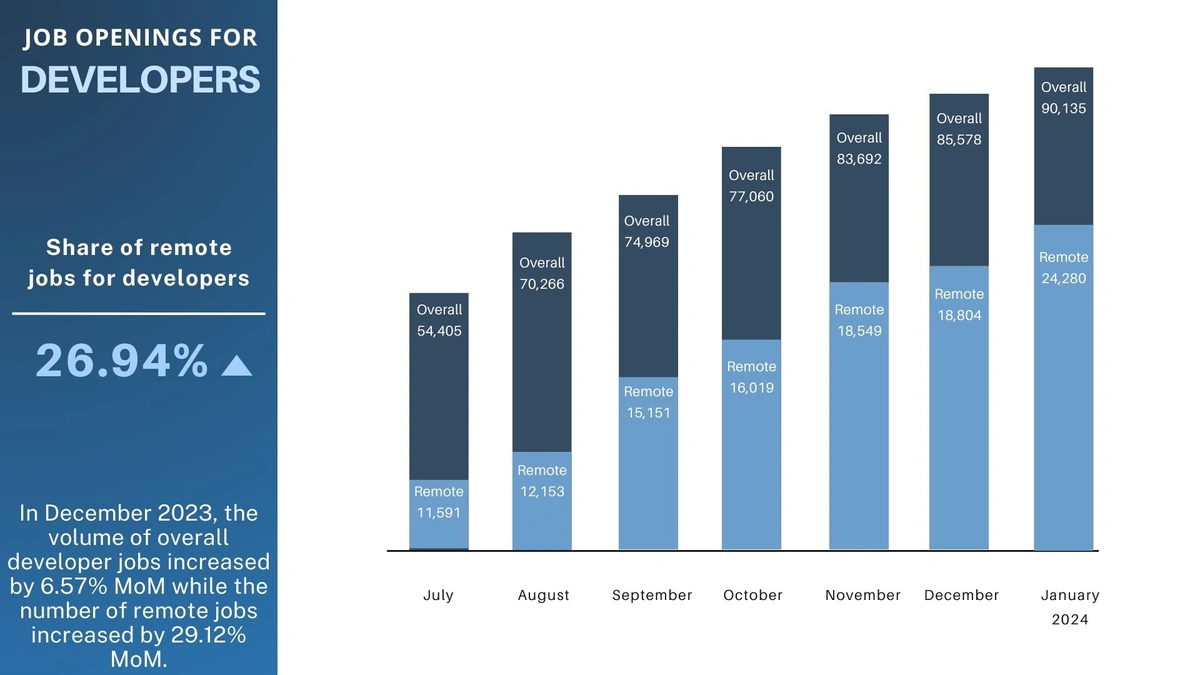How Remote Work Improves Developer Engagement and Retention
Table of Contents
Introduction
Technological advances make people more effective despite spending less time at work. This phenomenon was amplified by the altered work habits adopted to slow the spread of COVID-19. The situation forced people and organizations to explore new ways of working remotely, which had the unexpected consequence of increasing productivity.
In response, many companies, especially software organizations, are exploring how remote work can benefit the business and their employees.
Why is employee engagement crucial for business growth?
When developers enjoy and are appreciated for their work, their motivation increases. It boosts their desire to be more productive and helps them achieve the company's goals. Remote work can also play a significant role in enhancing employee motivation and satisfaction by improving their engagement and retention in organizations.
According to data shared by Linkedin, 74% of employees agree that the option to work remotely has increased their tenure at their company.
Frontline developers need an environment that supports the creative and innovative nature of their work. Many of today's developers prefer working remotely as it provides the most comfortable place to express their creative ideas.
Not all businesses are set up for fully remote work environments. Employers should at least consider giving developers some flexibility to choose where and how they work. This choice offers more than just freedom; it enables them to do their best work.
Benefits of Remote work for Developer's engagement and Retention-
Remote work brings lots of benefits to individual developers and their companies as a whole. Here are a few notable benefits:
-
Developers stay with the job longer.
In the current economy, many companies are facing attrition problems and low employee retention rates. Increasing salaries or offering better benefits are a few ways companies can retain employees. But this isn’t an option for every business. Embracing remote work could be the answer.
A survey of more than three thousand developers conducted by Stack Overflow and Indeed in August 2018 found that remote workers stay with their company an average of six months longer than employees who are not remote workers.
-
Improves mental health.
A study published in Harvard Business Review found that 26% of employees report better mental health or fewer complaints about mental health issues after one year of remote work. Most of the employees said they felt more motivated, productive, and happy working remotely than at the office and reported less stress, more satisfaction, and increased productivity.
-
Improves Productivity.
More productive and satisfied employees are more likely to stay with your company. Remote work lowers employees' stress levels, gives them the flexibility to work from home, and reduces unnecessary distractions that decrease productivity. It improves job satisfaction, which leads to higher performance, and the quality of work you receive improves. You may even consider hiring a dedicated development team to work remotely on your projects.
-
Greater engagement.
Remote work provides developers with the space and time that they need to focus on their projects. Messaging apps and audio and video conferencing platforms make it easy for remote workers to collaborate with co-workers, partners, and employees who work from different locations without having to leave their workstations to attend an in-person meeting. This makes the rest of the team more accessible to the developer and the developer more accessible to the rest of the team. Cutting out distractions and interruptions improves developer productivity.
-
Reduce costs.
Employers that allow remote work require less physical office space. That means they can reduce costs in rent and utilities. Employers may also find that there are tax savings or other financial benefits to employing developers remotely.
For employees, those cost savings may be returned in the form of benefits or additional perks. Remote employees also can save costs on transportation to and from work, food expenses, and other small “work-related” expenses that add up over time.
-
Larger talent pool.
Allowing remote work allows employers to find development talent across time zones and locations. Flexible working hours further expands the field of potential employees while also enabling prospective developers opportunities that may not be available in their physical location.
With more developers looking for remote job openings, there is more talent available on the remote job market.
For these reasons, companies should allow remote working opportunities to developers. Offering additional perks such as vacation days and flexible work schedules may further improve developer retention and engage them more with the organization. It also allows developers to maintain a better balance between their work and their personal life.
Conclusion
Remote work allows developers to work from the physical location that’s best for them, which leads to greater productivity, engagement, and retention. Furthermore, when developers can control their own time, they feel less stressed and more satisfied with their job, leading to higher performance at work.
Enhance your password security
The best software to generate and have your passwords managed correctly.


